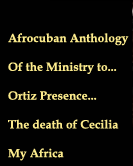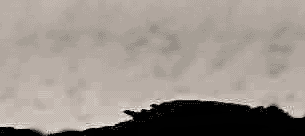




|
II. I have allowed myself this historical introduction because the cult to the orishas or entities mythical yorubás had its definitive conformation in clear sincrethysm processes and lost of cultures, successive or coincident, so much among a stronger culture represented by the oyoes or yorubás that were the akús that dominated the metals and groups of smaller development (without knowing these techniques) as the nagós, lucumíes and ibós; but also with neighboring cultures in relative equality of forces and such development the adjas, ewes, and fong dahomeyanos or the nupes, takuas or empés that habitin the northwest of Nigeria (3). It is notorious that at the same time of the occupation that carried out by the oyoes or yorubás and consolidated with the foundation of important cities like the Oyó, Ogbomoso, Abeokuta, Ifé, Ilesha, Iponda, Osogbo, Ejigbó, Aramoko, Iré and Ibadam, we see happen a process of establishment of local cults where the divinities of origin ibó and lucumí are supplanted by the yorubás, subtracting prints from the mentioned incorporated substitutions, occasionally not very peaceful, to the forms and practical liturgical of the new gods. To exemplify, we will mention some very well-known orichas in the Rule of Ocha or Cuban Santería: The cult to Oddúdduá in Ifé relegated to a second plane the one that paid in that region to Orisanlá-Obaigbó, of origin Ibó like is reflected in the second name. However, the priests of the primary divinity were linked some rites and ceremonials characteristic of the " oní " or king of the city. Another case is the cult to Sámpónná, also called Obaluáyé that substituted to the lucumí Naná Burukú Akitikata like protective against the pock and other contagious illnesses and whose devotion This also extended toward the in territory dahomeyano until the old Malhi. To have been less spectacular, doesn't stop to have especiall importance the fatigued cult to Oshún that swept with many cults smaller than root ibó, among groups that habited near the ibús or deep places of the river Ochún. When the oyoes or yorubás narrow and they perfect their commercial, political and cultural relationships with the Kingdom of Empé, we also attend modifications would originate them beliefs akú. As example it is possible to present the ancestral removal that the yorubás felt toward twins, had as omens of fatalities and characteristic of miserable people"; but everything changed it when they left deepening their bonds with the nupes or takuas for who twins and jimaguas were sacred. For that mutation it was necessary the creation of new orichas, the igbegis or idbeyis (Taiwó-Korné-Bomboché-Kainde-praise-Idou), and also the institution of remarkable social privileges in benefit to the mothers that had childbirths of twins , such as allowing them to sing and to dance to obtain money in the markets and public squares (6). After established the third migratory wave of the akú in Nigeria a definitive process should happen for its traditional beliefs. At the same time that the springs characteristic of the cult to the ancestors went to the most notorious characters in the group, commanders that had directed the migration and the conquests of the territories where they settled and who had some sanguine bond with the leader Oddúdduá Olofi in its immense majority he/she Heard, as well as the descendants of them until a third generation. Such new gods substitute those that formerly existed with identical attributions to those that now granted them in the busy places where they begin their cults, as well as the most remarkable aspects in the precedent liturgies, when they are not rejected for incompatible with the new rite, they are incorporate to those characteristic of the new mysteries. In strict sense the term orisha should be reserved only and exclusively for Obbatalá and to the group of divinities that you/they integrate its cult (Orishas Fun Fun or White Orishas), while the correct appellative for the other masculine gods turned out to be ebolas, the term imolé that Empega uses would embrace to the entirety of the gods yorubás; but the habit has sanctified the error, generalizing in such a way the employment of the term orisha that to attempt a rectification, besides a pedantry, it is already practically impossible. It is never of more to reiterate, against what many investigators have sustained in different moments that there is only a god, only and supreme, called Oloddúmaré, of the one who you/they emanate all the powers and the orishas middlemen inside this religion only constitutes between that Oloddúmaré and the men, because to the Supreme God they don't interest him for anything the human problems and it stops their attention creó to the orishas. Then, these " gods " or orishas don't become in almighty beings, neither even immortal as the divinities semitas, Greek or Germanic, on the contrary, their anthropomorphous condition is not circunscripta to a physical appearance, but rather it copies the entirety of the human thing and they are this way able to feel all the characteristic of the man, because they hate, they fear, they love, they are born, they live and they die. According to the essential character that you/they present the relative attributions of each orisha that were preserved in their American transculturaciones in good measure, these they can be contained in three different types: to) Cosmological Orishas. - They are those that are intimately related with the creation of the world, the nature, the man, and therefore with the time. The above-mentioned takes to establish a subdivision inside the group, because we would have creative orishas" that they are those of more hierarchy inside the vault yoruba, like it is the case of Obbatalá and the Fun Fun; next and the " oracles " like Orumla Ifá and the orishas of the nature like Osaín are in an equivalent plane. If we analyze the essential characteristics attentively in the operation of the Religion of the Orishas he/she can it turns as the same marrow of this belief it gravitates on these three orishas subgrupos, because the creators grant the full essence of the faith; the oracles bequeath the main mechanisms of the communication between the divinities and their believers, without that which cannot exist any religion type, and the natural orishas properly they contribute the liturgical techniques. b) Economic Orishas. - Here those should be included to who are attributed them the patronazgos on the such fundamental economic functions as the hunt, fishing, agriculture and cattle raising, as well as others derived of the previous ones which the public order, the trade and the communications. However, as the importance or weight of these divinities is directly linked with the importance that has this specific economic action for a certain society or region; when the American transculturaciones takes place the paper of these orishas inside the new systems of beliefs it will be very closely related with the relevance of keeping those functions in the new socioeconomic means and the participation that in they have it their believers. But the black slaves and later the libertos, had very little participation like proprietors in the American societies, in a such way that their own existence, I save in the cimarronaje and the fences, it didn't depend on the practice of the hunt, fishing, agriculture or cattle raising, and when they were in charge of of these works it was as helots or precarious salaried whose maintenance didn't really depend of themselves or, at least, the product of the work didn't go directly to their hands, for it the patron orishas of those activities was very diminished to the transculturation, remaining like the new systems magic-religious's part by virtue of their bonds with the divination or for the participation that you/they had ancestrally inside the mythical biographies and, in the specific liturgies of other orishas. Some were so modified that their attributions acquire a sense absolutely contrary to that of the original system. An example is the case of Ochossi, the boss of the hunt. As in the societies of hunters they are these those that the functions of " policemen " or " guardians " exercise, when taking care at nights the villages, to such they are estimated as the representatives of the order. However, in the new realities of the pro-slavery and discriminatory societies that found those slaves and their descendants in America, the order was them certainly adverse, as characteristic of a socioeconomic mark that spread to squash them, for it was necessary that one of its deities assumed the attribution of protecting them against that " order " and in that way Ochossi became, at least in the Cuban Santería, as boss of the jails and protective against the police. c) daily Orishas. - They are those that are in charge of of aspects so common in the human life as the own existence or the death, the love or the hate, the fire or the water, the maternity or the marriage, the music or the dance, the prosperity or the misery, the health or the illnesses, the age or the childhood, So much etc. in the system native as in their transculturaciones this orishas type raises tamaña popular devotion that not few times it surpasses the own limits of the religious system to become in a feature of identity. |






